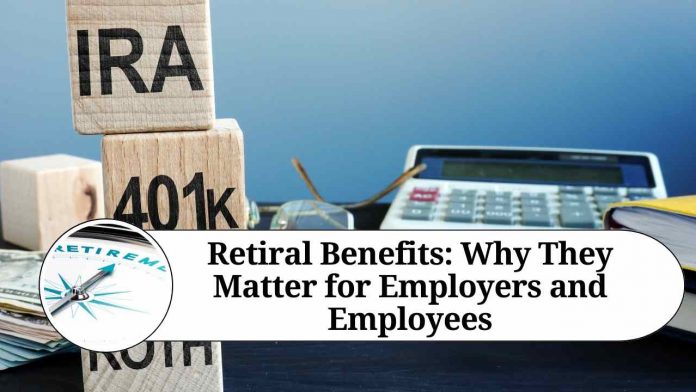Retirement is a time when people stop working and begin to enjoy their golden years. It is a time when individuals can relax and enjoy life, without worrying about work-related stress. Retiring from a job can be an exciting and rewarding experience, but it also requires careful planning to ensure that you have enough money to support yourself during your retirement years. One aspect of retirement planning that should not be overlooked is retiral benefits.
Retiral benefits are benefits that an employee is entitled to receive when they retire from their job. These benefits may include a pension plan, gratuity, provident fund, and other retirement benefits. The purpose of these benefits is to provide financial security for the employee during their retirement years. These benefits are typically based on the employee’s years of service, salary, and other factors.
One of the most common retiral benefits is a pension plan. Pension plans are retirement plans that provide a fixed income to employees after they retire. The amount of the pension is typically based on the employee’s years of service and salary. Pension plans can be either defined benefit plans or defined contribution plans. Defined benefit plans provide a fixed monthly income to the employee, while defined contribution plans allow the employee to contribute to their retirement account, which is then invested to provide a retirement income.
Another retiral benefit that employees may receive is a gratuity. Gratuity is a lump sum payment that is made to the employee when they retire. The amount of the gratuity is typically based on the employee’s years of service and salary.
Provident fund is also a popular retiral benefit. Provident fund is a retirement savings plan that is typically contributed to by both the employee and the employer. The funds in the provident fund are invested and grow over time. When the employee retires, they can withdraw the funds or receive a monthly income from the provident fund.
Retiral benefits are an important part of retirement planning. They provide financial security for employees during their retirement years. It is important for employees to understand the retiral benefits that they are entitled to and to plan accordingly. This may involve working with a financial advisor to determine the best retirement plan and investment strategy for their needs.
Additionally, retiral benefits can have tax benefits for both the employee and the employer. Contributions to a pension plan or provident fund may be tax-deductible, and the growth of the funds may be tax-deferred. This can provide significant savings for both the employee and the employer.
It is important for employers to regularly review and update their retiral benefits packages to ensure that they are competitive and meet the needs of their employees. Employers should also communicate the retiral benefits that are available to their employees and provide education and resources to help them understand their options.
Employees should also take an active role in understanding their retiral benefits and planning for their retirement. This may involve reviewing their retirement plan regularly and adjusting their contributions and investments as needed. Employees should also consider other sources of retirement income, such as Social Security, and plan accordingly.
Conclusion
Retiral benefits are an essential part of retirement planning for both employees and employers. They provide financial security and tax benefits for employees and can help employers attract and retain top talent. Employers and employees should work together to ensure that retiral benefits packages are competitive and meet the needs of all parties involved. With careful planning and education, retirees can enjoy a comfortable and financially secure retirement.
Other Related Blogs: Section 144B Income Tax Act
Frequently Asked Questions (FAQs)
Q: What are retiral benefits?
A: Retiral benefits are benefits that employees are entitled to receive when they retire from their job. These benefits may include a pension plan, gratuity, provident fund, and other retirement benefits.
Q: How are retiral benefits determined?
A: Retiral benefits are typically based on the employee’s years of service, salary, and other factors. For example, a pension plan may provide a fixed monthly income based on the employee’s years of service and salary.
Q: Are retiral benefits mandatory?
A: Retiral benefits are not mandatory in all countries or for all employers. However, some countries may have laws requiring employers to offer certain retirement benefits to their employees.
Q: What is a pension plan?
A: A pension plan is a retirement plan that provides a fixed income to employees after they retire. The amount of the pension is typically based on the employee’s years of service and salary.
Q: What is a gratuity?
A: A gratuity is a lump sum payment that is made to the employee when they retire. The amount of the gratuity is typically based on the employee’s years of service and salary.
Q: What is a provident fund?
A: A provident fund is a retirement savings plan that is typically contributed to by both the employee and the employer. The funds in the provident fund are invested and grow over time. When the employee retires, they can withdraw the funds or receive a monthly income from the provident fund.
Q: Can retiral benefits be transferred to another employer?
A: It depends on the type of retirement benefits. Some benefits, such as a pension plan, may be transferable to another employer, while others, such as a gratuity, may not be transferable.
Q: How can employees plan for their retirement?
A: Employees can plan for their retirement by understanding their retiral benefits, reviewing their retirement plan regularly, and adjusting their contributions and investments as needed. Employees should also consider other sources of retirement income, such as Social Security, and plan accordingly.
Q: What are the tax benefits of retiral benefits?
A: Contributions to a pension plan or provident fund may be tax-deductible, and the growth of the funds may be tax-deferred. This can provide significant savings for both the employee and the employer.




















